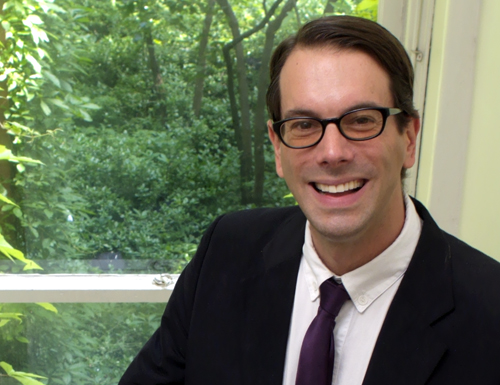
Today’s child development experts might disapprove, but Prof. Mark Lipton, School of English and Theatre Studies, says television was sometimes his childhood babysitter. He clearly recalls being plopped down in front of the TV set so that his mother could go out.
Reflecting on those experiences as an adult sparked Lipton’s interest in media and a desire to understand the effects of television on children.
As a student at Concordia University he majored in communication, and his thesis on children’s television included a TV pilot starring Lipton himself, who says he was “a cross between Mr. Rogers and Pee Wee Herman.”
As a graduate student, Lipton chose New York University to study with well-known author Neil Postman because he shared Lipton’s interest in education and technology. The American media theorist wrote Amusing Ourselves to Death and The Disappearance of Childhood, among many other titles. Lipton ended up working as Postman’s assistant for 10 years.
“As Postman aged, his interests shifted and he became nostalgic for older models of education,” says Lipton.
The Guelph professor doesn’t share that nostalgia. Lipton’s interests are in the scholarship of teaching and learning in a digital media age. Many of the concepts behind his work are explained in his new book, Research, Write, Create: Connecting Scholarship and Digital Media. Written with University of Missouri professor Twyla Gibson, the book is aimed at faculty and fourth-year and graduate students who are interested in engaging their research with digital media.
Naturally, the book has a companion website, which Lipton says took as long as the book itself to create and includes additional case studies and tools. He plans to keep updating it as needed to reflect the fast-changing world of technology.
He was, however, disappointed that Oxford Press asked to have the site locked so that only purchasers of the book can access it. Academics and researchers need to be aware of how communication has changed, he says. “Writing is an ancient form, and it is still the traditional format for most scholarly work.”
Lipton recalls being on doctoral committees where a student wanted to create a podcast or video or other digital form of communication as part of a traditional thesis manuscript, and the idea was greeted with a distinct lack of enthusiasm. “That’s a radical idea in most places,” he says. “But if we look at the real world, words on paper are no longer the dominant form of communication. Why do today’s students have to rely on an ancient form of communication when they have smart phones? Other media can be a viable way to represent scholarly ideas.”
A digital essay, for example, could include hyperlinks to articles quoted in the piece, and a video could include excerpts from people interviewed and images relevant to the topic.
Lipton’s book makes it clear, though, that “you can’t just make a video and call it a paper. It has to be the result of research and participating in the conversation of scholars.”
He points out that our methods of communication keep changing. The printing press may have been invented in 1450, but it took another 50 years before someone thought to add page numbers and indexes to the books that were produced. At that time, few people could read or write. By the 18th century, though, more people acquired these skills, and many used them to write diaries and letters. “Writing became social, it was something almost everyone knew how to do,” he says.
The same has happened with digital media. Blogs, once a craft, have now become social – something done by large numbers of people. “I agree that a lot of it is crap,” says Lipton, “but so were most of those 18th-century diaries.”
That didn’t mean there weren’t good writers in the 1700s; in the same way, there can also be good material found online. But in this context, Lipton says media literacy becomes even more important.
In his book, he helps readers understand how to research using digital media. In his own classes, both at U of G and at the University of Guelph-Humber, where he teaches in the media studies program, he uses Facebook and assigns students to create blogs for class.
“Universities are not about the transmission of knowledge, they are about learning to ask the right questions,” says Lipton. He suggests we have some important questions to ask about how to understand and use the evolving digital world.